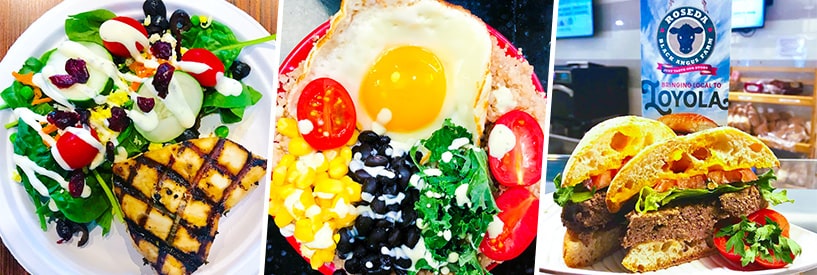Our Sustainable Commitment

Loyola Dining is proud to have made a commitment to making our dining operations as “green” as possible. Some of our sustainable practices include:
- Sourcing more than 20% of our food from Local Vendors through our FarmSource and Forged Partner Programs.
- Sending our spent fryer oil to be used to produce bio-diesel fuel rather than sending it to a rendering facility to be used for cosmetics or animal feed.
- r-BGH Free Milk and Dairy Products from a Local Farm
- Cage Free and Organic Shell Eggs and Liquid Eggs
- Stem to Root Cooking - Using scraps and trimmings from vegetables to make fresh stocks
- Pre-Consumer Compost Program- materials that are composted in the kitchen during food production, such as scraps and trimmings from fruits and vegetables.
- Post-Consumer Compost Program
- Onsite Recycling
- Digital Menu Boards to decrease paper waste
Reusable Dining in Boulder 2.0
Boulder 2.0 is only offering reusable dishware options in an effort to cut down on waste from disposable containers.
Dining In Boulder 2.0
- Guests dining in at Boulder 2.0 need to use provided reusable dishware. Once you are finished with your meal we ask that you scrape any leftover food into our designated compost bins, and place used dishes on the dish carts to be washed.
Post-Consumer Composting
What is Composting?
Composting is the process of collecting properly decomposed natural materials that
can be used to help enrich soil, and help plants grow.
What Can Be Composted?
There is a long list of items that can be composted, including leaves, yard trimmings,
shredded newspaper, and fireplace ashes. However, the materials that are most commonly
composted in dining operations are food scraps and certified compostable materials.
Pre-Consumer Vs. Post-Consumer Compost
- Pre-Consumer compost includes materials that are composted in the kitchen during food production, such as scraps and trimmings from fruits and vegetables. We are still operating our pre-consumer compost program in our kitchens.
- Post-Consumer compost includes materials that are composted by you, the consumer. These materials can include left over food scraps and certified compostable materials such as compostable plates, cups, and utensils.
What can be composted in our dining locations?
- All disposable wares, including to-go boxes, bowls, plates, cups, and utensils
- Napkins, paper straw wrappers
- Leftover food
What can't be composted?
- Trash, such as condiment packets or chip bags
- Recycling, such as aluminum, glass, or plastic bottles
What else can I do to help support Loyola Dining’s commitment to sustainability?
- Be mindful of food waste: Take a moment to think about how much you’d like to eat before grabbing your next meal. If you’ve taken your food to-go, you can always store it in your refrigerator for later if you haven’t finished it. If you’re dining at Boulder during A.Y.C.E, take a little bit of what you’d like- you can always go back for seconds!
- Recycling Properly: Make sure that you’re recycling properly by only depositing clean, dry, and loose cans, bottles, paper, and cardboard. Much like composting, it only takes one improperly recycled item to contaminate a whole bin. If you’re unsure of what can be recycled, you can reference the Sustainability Department’s Recycling Webpage.
Hours & Contact
Contact us with questions: dining@loyola.edu
Catering inquiries: catering@loyola.edu
Download Our Apps
- Nutrislice provides full menus daily, provides allergen information and updates in
real time!
Just type in the Loyola University Maryland when prompted and click on the specific locations, then the meal time, then the date you want to view. - GrubHub lets you skip the line and order ahead to pick up on campus!
To find Loyola's dining options go to settings, select "Campus Dining," and select Loyola University. - Transact E-accounts lets you check your meal plan balances and transactions.